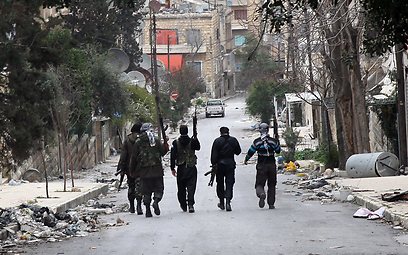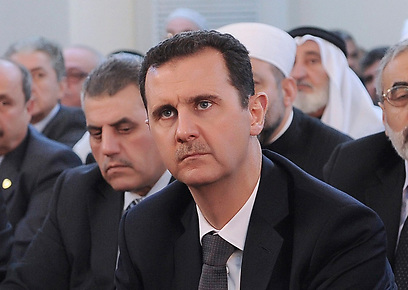
High-ranking Syrian general defects from army
Maj. Gen. Mohammed Ezz al-Din Khalouf, who defected with his son to Jordan, says many within Damascus regime have lost faith in it; claims Hezbollah fighting in 'more than one place' in Syria
One of the highest-ranking military officers yet to abandon Syrian President Bashar Assad defected to neighboring Jordan and said in an interview aired Saturday that morale among those still inside the regime had collapsed.
In another setback for the Assad regime, a leading human rights group accused Syria's government of stepping up its use of widely banned cluster munitions, which often kill and wound civilians.
Related stories:
- Hezbollah aids Syrian refugees
- CIA monitors potential terrorists in Syria
- Envoys: Iran steps up weapons lifeline to Assad
The twin blows illustrated the slowly spreading cracks appearing in Assad's regime as well as its deepening international isolation. While few analysts expect the civil war between Assad's forces and rebels seeking his ouster to end soon, most say it appears impossible for the 4-decade-old regime to continue to rule Syria.
Maj. Gen. Mohammed Ezz al-Din Khalouf announced his defection from Assad's regime in a video aired Saturday on the Al-Arabiya satellite channel. It showed him sitting next to his son, Capt. Ezz al-Din Khalouf, who defected with him.
The elder Khalouf said that many of those with Assad's regime have lost faith in it, yet continue to do their jobs, allowing Assad to demonstrate broad support.

Rebels in Aleppo (Photo: MCT)
"It's not an issue of belief or practicing one's role," he said. "It's for appearance's sake, for the regime to present an image to the international community that it pulls together all parts of Syrian society under this regime."
He also said fighters from the Lebanese terrorist group Hezbollah were fighting in Syria in "more than one place," but did not give further details.
The Syrian government did not immediately comment on the defection. It portrays the uprising as a foreign-backed conspiracy to weaken Syria being carried out by terrorists on the ground.
Seif al-Hourani, an activist from one of the rebel groups that helped get Khalouf and his family out of the country, said via Skype that Khalouf's son made contact with rebels about six months ago and leaked them information before he asked for help getting the family out of Syria.
That process took almost a week because of violence in the southern province of Daraa, the easiest place to shuttle Khalouf across the border, al-Hourani said.

'It's for appearance's sake.' Bashar Assad (Photo: Reuters)
Six days ago, rebels smuggled Khalouf, his wife, and three of their children out of Damascus to the southern province of Sweida. Two days later, they moved them to Daraa. They waited there until late Friday when it was safe enough to drive them to the border and hand them to Jordanian authorities, al-Hourani said.
Like many rebels, al-Hourani spoke on condition he be identified only by that nickname - by which he is widely known among his comrades - because he feared retaliation on his family.
Khalouf was chief of staff of the army branch that deals with supplies and fuel.
While rebels lauded his defection as a blow to the regime, it was unlikely to have a significant effect on Assad's ability to wage war.
Widespread defections among conscripts and low-level soldiers have sapped the Syrian army's infantry, but high-level defections have been rare, and Assad's air force and heavy munitions allow the government to pound rebel areas, even if it cannot take them back.
Still, cracks continue to spread through Assad's regime as rebel forces expand their areas of control and put increasing pressure on the capital, Damascus.
Also Saturday, Human Rights Watch said Syria's government is killing an increasing number of civilians with cluster bombs.
The New York-based rights group said Syrian forces have dropped at least 156 cluster bombs in 119 locations across the country in the past six months. The report said two strikes in the past two weeks killed 11 civilians, including two women and five children.
Cluster munitions open in flight, scattering smaller bomblets over a large area. Rights groups say they endanger civilians because they are imprecise and because civilians, mainly children, are often wounded or killed when they find unexploded bomblets.
Like all Middle Eastern countries except Lebanon, Syria is not party to the Convention on Cluster Munitions, an international treaty that prohibits the use, production, transfer and stockpiling of cluster bombs.
Human Rights Watch said it based its findings on field investigations and analysis of more than 450 amateur videos.
A senior Syrian government official on Saturday rejected the report, saying many amateur videos were suspect. He spoke on condition of anonymity because he was not authorized to speak to media.
Violence in Syria has killed some 70,000 people and displaced 4 million of the country's 23 million people, according to UN estimates.
On Saturday, rebels targeted the tallest building in the eastern city of Deir al-Zour with a two-ton car bomb, setting off clashes with regime troops, state TV and activists said.
State TV said rebels stormed the Insurance Building after the blast but failed to seize it from the government. The Britain-based Syrian Observatory for Human Rights said four fighters were killed in subsequent clashes with regime troops.
The Observatory also said at least 12 rebel fighters were killed in clashes near a cement factory in the northern city of Aleppo, and five people were killed when a shell exploded in the Damascus neighborhood of Qaboun.
Also Saturday, the head of Syria's leading opposition group issued an anniversary message to Syrians, saying that the uprising has "has taken a long time."
The opposition recognizes March 15, 2011 as the start of the uprising.
"Our people are great, our people are civilized and they don't need gangs to rule them," said Mouaz al-Khatib in a video posted on his Facebook page. "They just need to breathe a little bit of the air of freedom and they'll create as they have created in all places."
- Receive Ynetnews updates directly to your desktop










